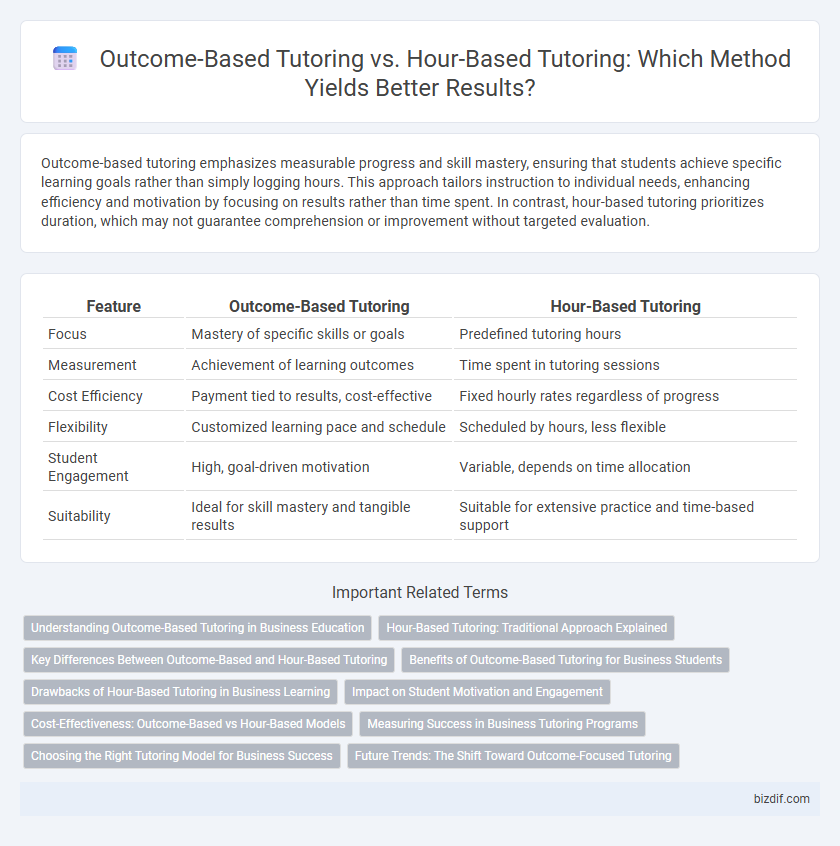Outcome-based tutoring emphasizes measurable progress and skill mastery, ensuring that students achieve specific learning goals rather than simply logging hours. This approach tailors instruction to individual needs, enhancing efficiency and motivation by focusing on results rather than time spent. In contrast, hour-based tutoring prioritizes duration, which may not guarantee comprehension or improvement without targeted evaluation.
Table of Comparison
| Feature | Outcome-Based Tutoring | Hour-Based Tutoring |
|---|---|---|
| Focus | Mastery of specific skills or goals | Predefined tutoring hours |
| Measurement | Achievement of learning outcomes | Time spent in tutoring sessions |
| Cost Efficiency | Payment tied to results, cost-effective | Fixed hourly rates regardless of progress |
| Flexibility | Customized learning pace and schedule | Scheduled by hours, less flexible |
| Student Engagement | High, goal-driven motivation | Variable, depends on time allocation |
| Suitability | Ideal for skill mastery and tangible results | Suitable for extensive practice and time-based support |
Understanding Outcome-Based Tutoring in Business Education
Outcome-based tutoring in business education emphasizes measurable student achievements such as mastering financial analysis or strategic planning skills, rather than merely logging tutoring hours. This approach aligns learning goals with real-world business competencies, ensuring that students gain practical expertise relevant to industry demands. By focusing on outcomes, tutors can personalize instruction to target specific gaps, enhancing overall student performance and employability.
Hour-Based Tutoring: Traditional Approach Explained
Hour-based tutoring relies on a fixed number of instructional hours, typically emphasizing quantity over specific learning outcomes. This traditional approach offers predictable scheduling and billing but may lack customization to individual student progress. Critics argue it can lead to ineffective learning if time spent does not align with the mastery of subject matter or skill development.
Key Differences Between Outcome-Based and Hour-Based Tutoring
Outcome-based tutoring emphasizes achieving specific learning goals and measurable student progress, while hour-based tutoring focuses on the total time spent in instructional sessions. Outcome-based approaches employ tailored lesson plans and continuous assessments to track mastery of concepts, whereas hour-based methods prioritize session duration regardless of actual skill acquisition. Key differences include the prioritization of results versus time, with outcome-based tutoring driving efficiency and personalized learning outcomes.
Benefits of Outcome-Based Tutoring for Business Students
Outcome-based tutoring for business students emphasizes mastering core competencies such as financial analysis, strategic decision-making, and market research, resulting in measurable skill development aligned with industry demands. This approach enhances employability by focusing on specific learning outcomes that match corporate expectations and career goals. Businesses benefit from interns and graduates who demonstrate practical expertise and problem-solving abilities rather than just accumulated tutoring hours.
Drawbacks of Hour-Based Tutoring in Business Learning
Hour-based tutoring in business learning often results in inefficient knowledge retention as it prioritizes time spent over mastery of concepts, leading to superficial understanding. This approach lacks clear performance metrics, making it difficult to measure actual progress or skill acquisition. Consequently, learners may complete hours without achieving meaningful outcomes, reducing the overall effectiveness and ROI of the tutoring investment.
Impact on Student Motivation and Engagement
Outcome-based tutoring enhances student motivation by providing clear goals and measurable achievements, fostering a sense of accomplishment and progress. This approach encourages active engagement through personalized feedback and targeted skill development, leading to higher retention and deeper understanding. Hour-based tutoring often lacks this focus, resulting in less sustained motivation and lower levels of student involvement.
Cost-Effectiveness: Outcome-Based vs Hour-Based Models
Outcome-based tutoring models prioritize measurable student progress and mastery of specific skills, often resulting in higher cost-effectiveness by aligning fees with achieved results rather than time spent. Hour-based tutoring charges by time regardless of learning outcomes, potentially leading to inefficiencies and less predictable returns on investment. Studies show that integrating outcome-based approaches can reduce unnecessary hours and optimize resource allocation, enhancing the overall value for both learners and educators.
Measuring Success in Business Tutoring Programs
Outcome-based tutoring measures success by tracking student progress through predefined learning goals, ensuring tangible improvements in business skills. Hour-based tutoring focuses on time spent, which may not accurately reflect knowledge retention or skill acquisition. Businesses benefit more from outcome-based approaches, as they directly align tutoring efforts with measurable performance indicators and return on investment.
Choosing the Right Tutoring Model for Business Success
Outcome-based tutoring prioritizes measurable student achievements and skill mastery, driving higher client satisfaction and long-term retention for tutoring businesses. Hour-based tutoring charges by session length, which may not align with individual learning paces, potentially limiting personalized progress tracking. Selecting the right tutoring model depends on business goals, with outcome-based approaches offering greater scalability and demonstrable value to attract and retain students.
Future Trends: The Shift Toward Outcome-Focused Tutoring
Outcome-based tutoring is gaining traction as personalized learning paths and measurable skill development become priorities in education technology. Data-driven approaches leverage learning analytics to tailor sessions that maximize student progress rather than simply logging hours. Emerging platforms emphasize competency mastery and employ AI to predict outcomes, signaling a shift from traditional hour-based models to results-oriented tutoring.
Outcome-based tutoring vs hour-based tutoring Infographic

 bizdif.com
bizdif.com